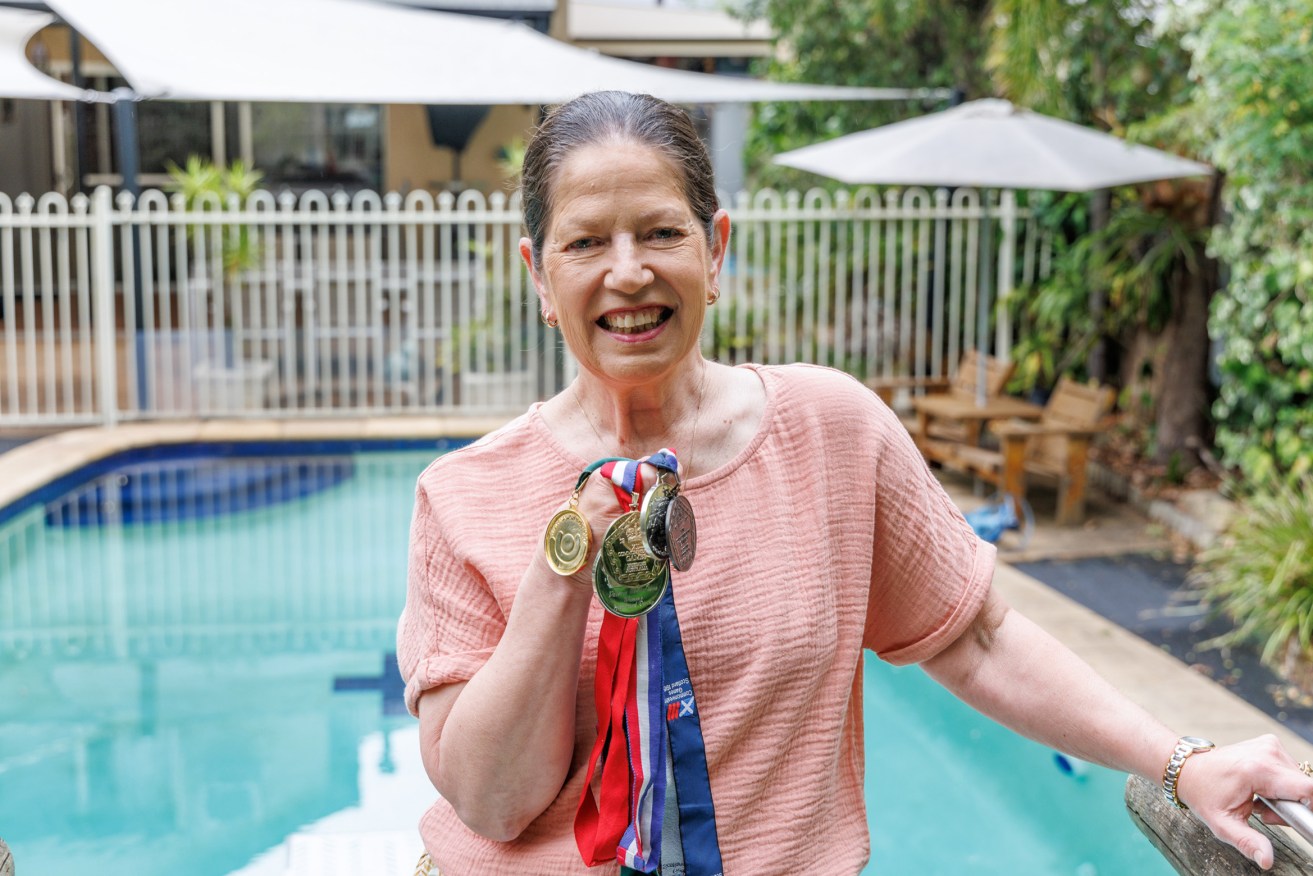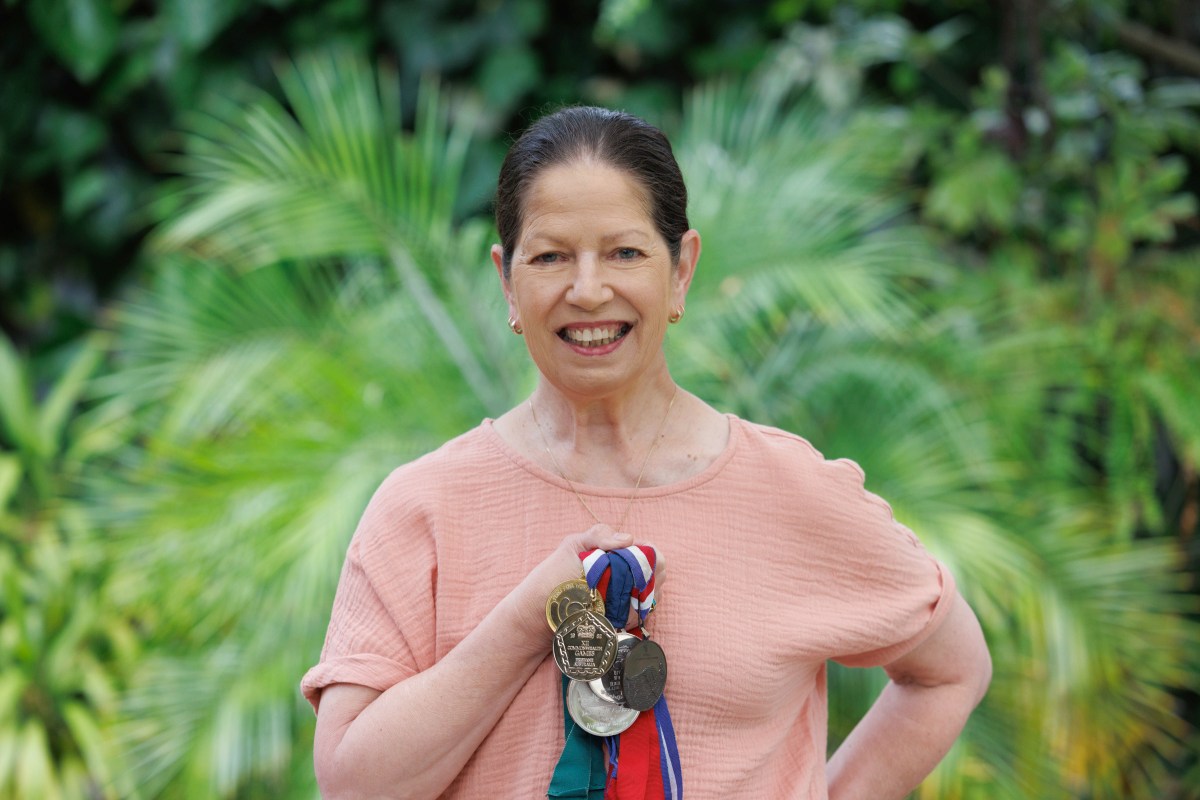Diving trailblazer Valerie Beddoe awarded SA Sport Hall of Fame status
Commonwealth Games gold medallist, World Cup winner and Olympic diver Valerie Beddoe AM will join elite company this year when she is inducted into the SA Sport Hall of Fame, a crowning achievement for one of Australia’s diving pioneers.


Valerie Beddoe is this year's second inductee into the SA Sport Hall of Fame (Photo: Tony Lewis/InDaily)
Beddoe, 61, won a gold medal, two silvers and a bronze at the Commonwealth Games and represented Australia in major international diving events on more than 40 occasions.
Competing in both platform and springboard, she dominated the sport in Australia during the late 1970s and ’80s – winning 14 national championships and more than 20 junior titles.
Her sixth-place finish in the 3m springboard event at the 1980 Olympics – and fifth-place finish on the 10m platform at the 1984 Games – made her the highest placed Australian at any diving event until Sydney 2000.
She also broke one of the longest-running droughts in Australian sport when she won gold at the 1979 World Diving Cup, becoming the first Australian diver to take home an international medal since Dick Eve won gold at the 1924 Paris Olympics.
Beddoe, who moved to South Australia in 1991, is just the second diver to be recognised in the SA Sport Hall of Fame, after three-time Olympic bronze medallist Robert Newbery was inducted in 2015.
“It’s a pretty amazing honour actually,” Beddoe told InDaily.
“I was very honoured and very flattered, and when I looked at the list of people that are already in the Hall of Fame, I’m very humbled actually.”
The SA Sport Hall of Fame was created in 2010 to recognise the outstanding achievements of athletes from South Australia.
Since then, 78 SA sportsmen and women – and four teams – have been inducted, with seven – Sir Donald Bradman, Bart Cummings, Barrie Robran, Victor Richardson, Gillian Rolton, Anna Meares and most recently Russell Ebert – awarded “legend” status.
Six new athletes will be inducted into the hall this year, with InDaily last week revealing South Australian paceman Jason Gillespie as this year’s first entrant.
InDaily will be profiling all six new Hall of Fame members when they are announced.
From regional Queensland to World Cup champion
Beddoe was born in the small town of Cloncurry in regional Queensland around 1700km northwest of Brisbane before making a move to Rockhampton where she would take her first diving lessons.
“We spent the whole summer at the pool, and I also went to the local YMCA and did gymnastics and trampolining,” she said.
“I loved tumbling and somersaulting and all of those sorts of things.”
After a move to Melbourne, she developed a preference for diving – feeling it allowed more freedom than the other acrobatic disciplines.
“The diving – while it still had a danger factor – had a little bit more freedom in being able to enter the water with minimal impact,” she said.
“There were other girls in the group my age and there was a social aspect to it as well, which I think is pretty important when you’re 13, 14.”
Success in the pool came early for Beddoe when she won a silver medal at the under 15 national championships within four months of starting regular training.
But she says her personal turning point came at the 1976 Olympic trials in Sydney where she would surprise everyone, including herself, by winning a preliminary event against the senior Australian women in the 3m springboard.
That was probably the moment where I thought I can hold my own with the senior girls
“At this point, I’d only been diving for two years and had no notion of even being part of the Olympic trials – I was just there because it was the national [championships] as well,” Beddoe recalls.
“In the preliminary event of the 3m, I won … and I was like, ‘wow, what does this mean?’
“I came last in the final out of eight [competitors], but I did win the preliminary and that just blew me away.
“And that was probably the moment where I thought I can hold my own with the senior girls … when I actually did beat people that I thought were way above me.”
Despite missing out on an Olympic ticket in 1976, she would make her first international trip two years later to the Commonwealth Games in Edmonton, Canada.
Beddoe, who was 17 at the time, said her first-time representing Australia on the world stage was much like her Olympic trials experience given she had “no knowledge of what I was going to be up against”.
Yet she would take home her first Commonwealth Games medal with a silver on the 10m platform.
“It was pretty satisfying because I was still quite a rookie at that point,” she said.
“And [it was] against the Canadians in particular, who were very strong with the women in that era, and a lot of those athletes had been around for a long time.
“So that was pretty exciting.”
Following her Commonwealth Games triumph, Beddoe went from strength-to-strength – travelling to the United States in 1979 to compete in the inaugural FINA Diving World Cup where she won a landmark gold medal for Australian diving.
The then-18-year-old wowed on the 3m springboard and scored 420.55 points from the judges, enough to pip Canadian diver Janet Nutter by 10 points and take out Australia’s first diving gold medal in 55 years.
Beddoe said the drought-breaking victory helped change the perception of Australia within the diving community.
“That was a gamechanger in terms of the recognition of Australia as a diving force,” she said.
“Previously we’d been strong in the Commonwealth but not against the rest of the world.
“So that really did help to lift out our respect on the international diving scene.”
Beddoe then qualified for her first Olympics at Moscow in 1980 alongside fellow Australian divers Steve Foley and Jenny Donnet. The trio would perform under the Olympic flag amid the “disquieting” controversy surrounding the 1980 Summer Olympics boycott.
Despite the odds stacked against the Australian team and a “predominantly eastern European judging panel” calling the shots, Beddoe says she relished the Olympic experience.
Still a teenager, she would become the first Australian ever to qualify for the Olympic finals on both the 3m springboard and 10m platform events. She finished sixth and seventh.
“I was the only non-eastern European competitor in both finals, so to me that was a win in itself,” she said.
“I was disappointed with my sixth in the 3m, I’d been hoping to go one better following on from the World Cup the previous year.
“But the environment made that probably a little bit tougher.”
Beddoe attempted to defend her World Cup title in 1981 but fell short with a bronze medal. The next year, however, she would have the opportunity to dive in front of a packed home crowd for the first time in her career at the 1982 Commonwealth Games in Brisbane.
The support you receive at a home Games whether it’s Commonwealth or Olympics is amazing and very uplifting.
“Because diving is a relatively minor sport, to have a home crowd cheering for you where normally you would have half a dozen people on your side was fantastic,” she said.
“My parents were there, my family members were there which had never been able to happen before.
“The support you receive at a home Games whether it’s Commonwealth or Olympics is amazing and very uplifting.”
Beddoe made the most of the opportunity, holding off a late charge from another Canadian rival, Jennifer McArton, to narrowly squeeze out a 404.16 to 390.21 victory in the 10m platform.
The Australian diving star also took home a bronze in her stronger 3m springboard event in Brisbane and would back it up with a silver on the platform at the 1986 Edinburgh Games.
Throughout her career, she led the sport as Australia’s first woman to pull off a three and a half somersault dive and a three and a half somersault dive in the pike position.
Beddoe says the achievements meant little during her competition days, but on reflection, she’s been able to get a better grasp of their impact.
“It did pave the way for people to go, ‘oh, well they’re not so hard; if she can do it, we can do it,” Beddoe said.
“So in that sense, yes, I did pave the way for others to go, ‘I can do that too’, and therefore … increase their international competitiveness.”
Beddoe secured her second and final Olympic selection for the 1984 Los Angeles Games where she finished fifth in the 10m platform but missed out on a place in the 3m springboard final.
A few nagging injuries began to take their toll and in 1987 Beddoe called time on her storied international career – leaving the platform as one of Australia’s most decorated divers.
Life out of the water

Beddoe at home with her medal haul (Photo: Tony Lewis/InDaily)
Beddoe dived straight into a coaching career after retirement.
She started as a diving coach with the Australia Institute of Sport in 1987 and would be appointed Diving Australia’s national high-performance manager in the lead up to the Sydney Olympics.
After moving to Adelaide in 1991, she was also the personal mentor to South Australian divers Shannon Roy, Scott Weeks and Lynda Folauhola. Roy would win a Commonwealth Games gold medal in 1998 on the 3m springboard.
Beddoe said transitioning straight into elite-level coaching helped her avoid the mental challenges often associated with athletes who struggle to adjust to normal life.
“I did miss being an athlete a little bit, there’s quite a lot of highs that you get in succeeding and learning new things,” she said.
“But I didn’t have the depression that you hear about from a lot of athletes because I did go straight into coaching.
“So I was still right in the thick of things which probably made it a lot easier.”
Beddoe has also spent time on the administration and management side of the sport, taking on roles as a national selector, Diving Australia board member and Commonwealth Games judge.
In 2000, she was awarded the Australian Sports Medal and in 2001 appointed to the Order of Australia in recognition of her services to diving as an athlete, coach and administrator.
Since departing the sport as an administrator, she has found a new calling as a full-time seamstress and has made the most of a long-time sewing hobby.
She lives with her husband and has raised two daughters who now live in Melbourne and Port Pirie.
The 2021 class will be inducted into South Australian Sport Hall of Fame at a black-tie event at Adelaide Oval on April 8. For more details and to purchase tickets, go here.




